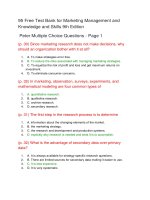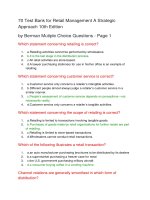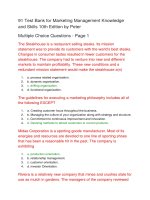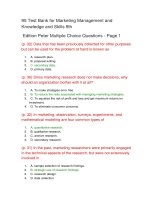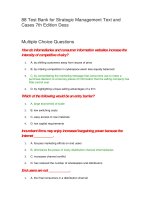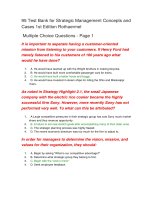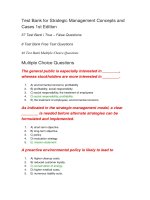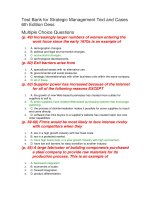91 test bank for marketing management knowledge and skills 10th edition by peter
Bạn đang xem bản rút gọn của tài liệu. Xem và tải ngay bản đầy đủ của tài liệu tại đây (142.15 KB, 23 trang )
91 Test Bank for Marketing Management Knowledge
and Skills 10th Edition by Peter
Multiple Choice Questions - Page 1
The Steakhouse is a restaurant selling steaks. Its mission
statement was to provide its customers with the world’s best steaks.
Changes in consumer tastes resulted in fewer customers for the
steakhouse. The company had to venture into new and different
markets to maintain profitability. These new conditions and a
redundant mission statement would make the steakhouse a(n)
1.
2.
3.
4.
a. process related organization.
b. dynamic organization.
c. drifting organization.
d. functional organization.
The guidelines for executing a marketing philosophy includes all of
the following EXCEPT
1.
2.
3.
4.
a. Creating customer focus throughout the business.
b. Managing the culture of your organization along with strategy and structure.
c. Commitment to continuous improvement and innovation.
d. Devising methods to attract customers to current products.
Midas Corporation is a sporting goods manufacturer. Most of its
energies and resources are devoted to one line of sporting shoes
that has been a reasonable hit in the past. The company is
exhibiting
1.
2.
3.
4.
a. production orientation.
b. relationship management.
c. customer orientation.
d. investor Orientation.
Riviera is a relatively new company that mines and crushes slate for
use as mulch in gardens. The managers of the company reviewed
its short history, took into account the organization’s environment,
and identified its distinctive competencies. What are the managers
at Riviera trying to accomplish?
1.
2.
3.
4.
a. Develop a mission statement
b. Distinguish between primary and secondary objectives
c. Develop an effective marketing mix
d. Evaluate its marketing plan
Identify the type of marketing which is designed to attract donors,
members, participants or volunteers.
1.
2.
3.
4.
a. Product
B. Organization
c. Place
d. Cause
The mission statement, or purpose, of an organization is the
description of its reason for
1.
2.
3.
4.
a. revenues.
b. profitability.
c. existence.
d. growth.
Effective marketing requires that _____ come first in organizational
decision making.
1.
2.
3.
4.
a. advertising strategies
b. selling orientation
c. production orientation
d. consumer needs
An organization seeking to make a profit by serving the needs of
customer groups is focusing on
1.
2.
3.
4.
a. customer orientation.
b. production orientation.
c. selling orientation.
d. personal marketing orientation.
Which of the following statements about a mission statement is
true?
1.
a. Even though no one denies the importance of the mission statement, it is
the least used of all of the management tools.
2. b. An effective mission statement takes an internal organizational focus.
3. c. It should focus on the physical product or service that the organization is
offering at present.
4. d. It should focus on the broad class of needs that the organization is seeking
to satisfy.
Which type of marketing would involve strategies to elect a political
candidate?
1.
2.
3.
4.
a. Product
b. Service
c. Person
d. Place
All of the following are key elements that the management must
take into account while developing a statement of mission,
EXCEPT
1.
2.
3.
4.
a. the organization’s history.
b. the organization’s distinctive competencies.
c. the organization’s culture.
d. the organization’s environment.
Marketing managers can satisfy customers more efficiently in the
present than anticipate changes in customer needs in the future.
Which of the following best explains this statement?
1.
2.
3.
a. Organizations need more planning to devise better sales strategies.
b. Marketing strategies should focus on production orientation.
c. Managers need to first identify customer needs and then work backwards to
devise products and services to satisfy these needs.
4. d. Organizations need new customers; hence the need to manipulate
customers to do what suits the interests of the firm.
Zest sports, manufactures sports goods. They introduce a new
product targeted at children between ages 7 and 10. The marketing
team envisions an entirely new marketing strategy for its sport
goods. This is an example of which type of marketing?
1.
2.
3.
4.
a. Product
b. Service
c. Cause
d. Place
Over three-quarters of the 100 largest U.S. corporations of 70 years
ago have fallen from the list because
1.
2.
3.
a. of regulations that disallowed their business activities.
b. of unfair trade practices.
c. they failed to recognize that strategies need to reflect changing
environments.
4. d. their mission was just to provide value for customers, employees, and
investors.
Which of the following observations is true?
1.
2.
a. Companies should be managed principally for current cash flows.
b. Firms that bet solely on the future are immune to takeover and other
threatening actions.
3. c. An intense focus on the near term can produce risk aversion that may
cause stagnation.
4. d. Companies should focus solely on long run gains.
The core things that an organization does well are known as its
1.
2.
3.
4.
a. distinctive values.
b. distinctive competencies.
c. distinctive ideals.
d. distinctive technologies.
The purpose of the marketing concept is to rivet the attention of
marketing managers on serving broad classes of
1.
2.
3.
4.
a. supplier needs.
b. employee needs.
c. management needs.
d. customer needs.
Candela Company’s goal is to sell 500 theatre lighting systems
every year. What can one conclude from this objective?
1.
2.
3.
4.
a. The company has a customer orientation.
b. The company does not adhere to the marketing concept.
c. The company is determined to satisfy customer needs.
d. The company wants to use a customer focused strategy.
The mission statement of a company should have a(n)
1.
2.
3.
4.
a. product focus.
b. external focus.
c. internal focus.
d. service focus.
When the mission statement of an organization is focused on
markets rather than products, it means that the mission statement
1.
2.
3.
4.
a. has an external rather than an internal focus.
b. needs to divert toward internal problems.
c. needs to change its focus to services.
d. is focusing on the narrow class of needs.
The customer will be more satisfied and the firm will be more
profitable when
1.
2.
3.
4.
a. organizations and customers have a long-term relationship.
b. the sales process is product oriented.
c. products are advertised frequently.
d. products are sold at discounts at regular intervals.
Organizations expand into new products, new markets and even
new industries. In this process, the organization’s original purpose
may become irrelevant. In these circumstances the organization
can be best described as a
1.
a. drifting organization.
2.
3.
4.
b. functional organization.
c. horizontal organization.
d. cooperative organization.
The organization's environment provides the resources that sustain
the organization. In exchange for these resources, the organization
must supply the environment with
1.
2.
3.
4.
a. services without any additional cost.
b. high priced but quality goods.
c. quality goods at an acceptable price.
d. community service at all times.
The true mission of a company is to provide value for three key
constituencies, namely
1.
2.
3.
4.
a. investors, employees, and customers
b. investors, customers, and politicians
c. managers, employees, and customers
d. employees, customers, and families
The organization’s _____ dictates the opportunities, constraints and
threats that must be identified before a mission statement is
developed.
1.
2.
3.
4.
a. history
b. culture
c. environment
d. competencies
_____ includes all the activities that lead to the development of a
clear organizational mission, organizational objectives, and
appropriate strategies to achieve those objectives.
1.
2.
3.
4.
a. Strategic planning
b. Organization’s growth
c. Financial planning
d. Media planning
Fifteen years ago Frank and Emily Frazer started the Vidalia Onion
Store for the purpose of sharing the taste of sweet Vidalia onions
with the world. In recent years, the couple has added other Georgia
products, such as peanuts, peaches and pecans to its inventory,
without changing the business’s name or its mission. The store can
now be described as a
1.
2.
3.
a. drifting organization.
b. customer oriented organization.
c. competitive organization.
4.
d. changing organization.
Ecolon is a major manufacturer of wind turbines and related
equipment, and is also a leader in turbine installations and
maintenance. In large organizations such as this, the marketing
plans of individual departments are usually guided by
1.
2.
3.
4.
a. plans rolled out by the production unit.
b. sales strategies of the marketing department.
c. planning activities of the organizational units.
d. strategic plans or blueprints for the entire organization.
Which of the following is NOT a basic question an organization
must answer when examining and restating its mission?
1.
2.
3.
4.
a. What is our business?
b. Who is the customer?
c. What do customers value?
d. What is our sales strategy?
_____, if performed successfully, plays a key role in achieving an
equilibrium between the short and the long term by balancing
acceptable financial performance with preparation for inevitable
changes in markets, technology, and competition, as well as in
economic and political arenas.
1.
2.
3.
4.
a. Production planning
b. Team planning
c. Strategic planning
d. Sales planning
The organization’s mission, objectives, strategies, and its portfolio
plan are the four major components of its
1.
2.
3.
4.
a. strategic plan.
b. mission statement.
c. sales strategy.
d. marketing plan.
Focusing on building long-term _____ where the initial sale is
viewed as the beginning step and not as the end goal, is the crux of
the marketing concept.
1.
2.
3.
4.
a. gross margins
b. advertising campaigns
c. investor relations
d. customer relationships
91 Free Test Bank for Marketing Management
Knowledge and Skills 10th Edition by Peter Multiple
Choice Questions - Page 2
At the supermarket, Linda noticed that her favorite stain remover
now comes in spray bottles, 2 sizes of aerosol cans and a refill
bottle. Given this information and the fact that the stain remover has
reduced its shelf price by 5 percent, you could say the manufacturer
of the stain remover has implemented a _____ strategy.
1.
2.
3.
4.
a. market differentiation
b. product development
c. diversification
d. market penetration
Freddy’s Ice Cream developed a line of whole fruit sorbets targeted
at people who are loyal Freddy’s consumers, but dislike all the fat
and calories in ice cream. What organizational growth strategy was
used here?
1.
2.
3.
4.
a. Product development
b. Diversification
c. Customer value
d. Market development
The advertising for Bertolli spaghetti sauce states that it is the only
leading brand of sauce made from tomatoes picked no more than
24 hours before they are used. Therefore, Bertolli claims to taste
more like homemade because it is fresher. Identify the strategy
used by Bertolli to gain competitive advantage.
1.
2.
3.
4.
a. Product development
b. Diversification
c. Product diversification
d. Differentiation
One of the potential sources of cross functional conflict for a
marketer includes the conflict of rigid budgets vs. flexible budgets.
This is a conflict associated with which organizational function?
1.
2.
3.
4.
a. Finance
b. Production Operation
c. Accounting
d. Research and development
Market development strategy involves
1.
2.
3.
4.
a. increasing the sale of present products to present customers.
b. finding new customers for its present products.
c. targeting present customers for the newly developed products.
d. leading an organization into entirely new and unrelated businesses.
Which of the following does NOT pertain to organizational
objectives?
1.
2.
a. They can be converted into specific action.
b. They serve as a starting point for specific objectives at lower levels in the
organization.
3. c. They establish short-run priorities for the organization.
4. d. They serve as standards against which overall organizational performance
can be evaluated.
Which of the following is true of organizational objectives?
1.
a. An organizational objective should reflect on the organization’s finances
rather than its commitment to the customers.
2. b. Objectives are not considered dominant necessities to carry out the
organizational mission.
3. c. Objectives are specific, measurable, action commitments on the part of the
organization.
4. d. An organizational objective is distilled to arrive at a specific and achievable
organization mission.
Which of the following observations pertain to strategic business
units?
1.
2.
3.
a. They share the organizational mission statement.
b. They have centralized management, no competitors and little autonomy.
c. They are a number of organizations which have come together to achieve
some common goal.
4. d. They can be planned independently of the other businesses of the total
organization.
What is most likely wrong with the following mission statement for a
store that sells lighting fixtures: “Our mission is to make sure every
customer who buys a lighting fixture at our store is 100 percent
satisfied with his or her purchase?”
1.
2.
3.
4.
a. The mission statement is not specific.
b. The mission statement is not well framed.
c. The mission statement cannot fulfill the organizational productivity.
d. The mission is not achievable or realistic.
5.
Huggies first started out in the disposable diaper industry. It then
developed ‘Pull-Ups’ that were disposable training pants for kids
who were in the transition stage between diapers and cloth
underwear. What kind of a growth strategy did Huggies use when it
developed this new product?
1.
2.
3.
4.
a. Diversification
b. Porter’s model
c. Market penetration
d. Product development
Betty’s, a fashion accessories company is continuously on the lookout to expand its market overseas. This instance describes
1.
2.
3.
4.
a. market development.
b. market segmentation.
c. market consolidation.
d. market differentiation.
The marketing slogan, “It’s not just for breakfast anymore” has been
very successful for the orange juice industry. With this slogan, the
orange juice industry is trying to get people who like a glass of
orange juice with their breakfast to consider having a glass at
another time of the day, like as an afternoon snack instead of a
cola. This slogan is most closely related to a
1.
2.
3.
4.
a. product diversification strategy.
b. market penetration strategy.
c. product development strategy.
d. market integration strategy.
The Grand Ole Opry shows are played in an auditorium that is at
best 75 percent full. Most of the audience is over 50. One of the
ideas suggested to increase its audience size and appeal to
younger country music fans is to use webcasts of the Opry shows
on the Internet. In terms of organizational strategies, this is an
example of
1.
2.
3.
4.
a. market penetration.
b. diversification.
c. product focusing.
d. market development.
The ability to outperform competitors in providing something that
the market values, is called
1.
2.
3.
4.
a. diversification.
b. market promotion.
c. competitive advantage.
d. market analysis.
When an organization has formulated its mission and developed its
objectives, the next managerial task is to develop
1.
2.
3.
4.
a. job descriptions.
b. organizational strategies.
c. mission and vision statements.
d. cross-functional teams.
Maintaining consistent levels of employee satisfaction with our own
and similar industries could be a possible objective of which of the
following areas of performance?
1.
2.
3.
4.
a. Market standing
b. Worker performance and attitude
c. Manager performance and responsibility
d. Productivity
A product development strategy
1.
2.
3.
4.
a. involves seeking new products for customers not currently being served.
b. offers product-line extensions of existing products to present customers.
c. involves merely getting a product to a new market.
d. deals with developing a production plan for a product.
Healthline is Eckerd Drug Stores’ brand of incontinence products.
Healthline products sell for $2 to $5 less than the rival Depends
brand. According to Michael Porter’s model, Eckerd is using a
_____ strategy to market Healthline products.
1.
2.
3.
4.
a. differentiation
b. product development
c. market development
d. cost leadership
All of the following are some common shortcomings in mission
statements, EXCEPT:
1.
a. They do not provide direction to decision makers when faced with
product/market choices.
2. b. They are not motivational.
3. c. They are too broad and do not rule out any opportunity management might
wish to pursue.
4. d. They are externally focused instead of having an internal focus.
If formulated properly, all of the following are end results of an
effective organizational objective, EXCEPT:
1.
2.
a. They can be converted into mission and vision statements
b. They will provide direction and serve as a starting point for more specific
and detailed objectives at lower levels in the organization
3.
4.
c. They can establish long-run priorities for the organization
d. They can facilitate management control because they serve as standards
against which overall organizational performance can be evaluated
As part of its 1998 summer ad campaign, NBC ran ads that
previewed reruns of popular TV programs and used the slogan,
“New to You” to get people who had missed the shows during the
previous season to watch. This slogan is most closely related to
which of the organizational growth strategies?
1.
2.
3.
4.
a. Product development
b. Market development
c. Market diversification
d. Market penetration
Protecting and maintaining resources such as equipment, buildings,
inventory and funds could be a possible objective of which of the
following areas of performance?
1.
2.
3.
4.
a. Physical and financial resources
b. Productivity
c. Market standing
d. Manager performance and attitude
In the mid-1990s, McDonald’s opened a new chain of restaurants
called Hearth Express. Hearth Express was targeted at McDonald’s
current customers who wanted a more leisurely home-style meal.
The Hearth Express menu included rotisserie chicken, twice-baked
squash, baked beans and fresh baked bread. Identify the strategy
used by McDonald’s in introducing Hearth Express.
1.
2.
3.
4.
a. Market development
b. Product differentiation
c. Market penetration
d. Product development
There are more than a half dozen different sports drinks in the
market, but only one brand - Juicy Juice Score by Libby’s, is made
with real fruit juice. What kind of organizational strategy based on
competitive advantage is Libby’s using with Juicy Juice Score?
1.
2.
3.
4.
a. Strategy based on customer value
b. Strategy based on differentiation
c. Strategy based on cost-leadership
d. Strategy based on diversification
Which strategy focuses primarily on increasing the sales of present
products to present customers?
1.
2.
3.
4.
a. Market development strategy
b. Product development strategy
c. Diversification strategy
d. Market penetration strategy
91 Free Test Bank for Marketing Management
Knowledge and Skills 10th Edition by Peter Multiple
Choice Questions - Page 3
According to the General Electric Portfolio Model, what should an
organization do with its SBUs that fall into the red zone?
1.
2.
3.
4.
a. Hold share and build share
b. Harvest or divest
c. Produce and divest
d. Build share and harvest
According to the cross-functional perspective of strategic planning,
all functional area plans should be derived from the strategic plan
while at the same time contributing to the achievement of it. Which
of the following is NOT a functional area plan derived from the
strategic plan?
1.
2.
3.
4.
a. Production plan
b. Finance plan
c. Portfolio plan
d. Technology plan
Recently there has been a shift from the traditional role of
marketing, which was based on dividing work according to function,
to bringing managers and employees together to participate in
1.
2.
3.
4.
a. cross-functional teams.
b. production teams.
c. function based teams.
d. line teams.
The BCG matrix identifies _____ as SBUs that have a low share of
a low-growth market.
1.
2.
3.
4.
a. cash cows
b. question marks
c. stars
d. dogs
The National Basketball Association (NBA) charges a family of four
about $200 for tickets to see a basketball game at Madison Square
Garden. Concerns that many people do not have the sort of
discretionary income that makes such a family outing possible has
led the NBA to come up with creative discounts. This has shown
that NBA is responsive to the _____ environment.
1.
2.
3.
4.
a. social
b. competitive
c. cooperative
d. economic
Designing additional features into a product that will induce new
uses by existing buyers can be best described as an objective of
the _____ department.
1.
2.
3.
4.
a. production
b. marketing
c. support
d. sales
All of the following are true with respect to establishing marketing
objectives EXCEPT
1.
2.
3.
4.
a. They are derived from organizational objectives.
b. They are stated as standards of performance.
c. They provide a framework for the marketing plan.
d. They are a set of controllable variables used for the target market.
The _____ for Pepsi includes lemon-lime drinks, fruit juice, bottled
water, sports drinks, other colas, caffeine-free colas, diet drinks,
cherry-flavored drinks and dairy beverages.
1.
2.
3.
4.
a. competitive environment
b. technological environment
c. cooperative environment
d. economic environment
Which of the following statements is true of strategic planning in
well-managed institutions?
1.
a. Strategic planning is clearly a top management responsibility and does not
require the active participation of marketing managers.
2. b. Planning done in functional areas of the organization should be
independent of the strategic plan.
3. c. There is no direct relationship between strategic planning and the planning
done by managers at all levels.
4. d. Marketing executives are involved in the strategic planning process as they
influence the process by providing important inputs.
Performing marketing tasks according to a predefined schedule is a
part of
1.
2.
3.
4.
a. establishing the marketing plan.
b. developing the marketing plan.
c. implementing the marketing plan.
d. controlling the marketing plan.
This is an example of a marketing department objective: “Increase
market share by 5 percent by attracting new market segments or
improving position among current market segments for existing
products by year-end.” This objective would best suit which of the
following organizational strategies?
1.
2.
3.
4.
a. Market penetration or market development
b. Market development or product development
c. Diversification or market penetration
d. Product development or diversification
Portfolio models
1.
a. provide a long-term time perspective for analyzing the organization’s
external environment.
2. b. examine the competitive position of an organization’s principal rivals.
3. c. classify SBUs to determine the future cash contribution that can be
expected from each of them.
4. d. are not effective in situations where management must make resource
allocation decisions across product lines.
Recently, antitrust concerns almost forced Microsoft to ship
Windows 7 without its Web browsing application, Internet Explorer
(IE), in European Union member states. This is an example of how
the _____ environment can affect businesses.
1.
2.
3.
4.
a. cooperative
b. legal
c. social
d. economic
If done properly, _____ helps in clearly defining a blueprint for
management action in all functional areas of the organization.
1.
2.
3.
4.
a. sales promotion
b. strategic planning
c. production planning
d. finance planning
The removal of tariffs on the importation of Canadian lumber will
adversely affect the U.S. lumber industry because Canada is able
to produce lumber much more inexpensively than the U.S. This tariff
removal is an example of how the _____ environment can affect
businesses.
1.
2.
3.
4.
a. cooperative
b. comparative
c. social
d. legal
Which of the following can be defined as “the process of planning
and executing the conception, pricing, promotion, and distribution of
goods, services, and ideas to create exchanges with target groups
that satisfy customer and organizational objectives?”
1.
2.
3.
4.
a. Diversification
b. Perceptual mapping
c. Vendor management
d. Marketing management
Which of the following objectives seek to increase the products
short-term cash flow without concern for the long run impact?
1.
2.
3.
4.
a. Hold share
b. Harvest
c. Divest
d. Build share
Monsanto is an enterprise that is composed of three parts. Its
biotech section, which is working to develop crops that are pest and
disease-resistant so farmers can eventually eliminate chemical
spraying, provides about half of its sales. Pharmaceuticals from its
G.D. Searle subsidiary contribute a third of its revenues; and food
products, dominated by the artificial sweetener NutraSweet, make
up less than 20 per cent of its total revenue. These three divisions
are Monsanto’s
1.
2.
3.
4.
a. strategic business units.
b. sales-buying units.
c. small business units.
d. segmented business units.
Which objective allows market share to decline in order to maximize
earnings and cash flow and is appropriate for weak cash cows,
weak question marks, and dogs?
1.
2.
3.
4.
a. Hold share
b. Harvest
c. Divest
d. Build share
The cooperative environment includes
1.
a. all firms and individuals who have a vested interest in accomplishing the
firm’s objectives
2. b. primarily other firms in the industry that rival the organization for both
resources and sales
3. c. the attitudes and reactions of the general public, social and business critics
4. d. protection against business competition and consumer rights
5.
Which of the following is not a major area of concern for situation
analysis?
1.
2.
3.
4.
a. Political environment
b. Competitive environment
c. Physical environment
d. Social environment
Which of the following observations is true of the “build share”
objective?
1.
2.
a. It sacrifices immediate earnings to improve market share.
b. It increases the product’s short-term cash flow without concern for the longrun impact.
3. c. It involves selling or divesting the SBU because better investment
opportunities exist elsewhere.
4. d. It is very appropriate for dogs and those question marks the firm cannot
afford to finance for growth.
On what assumption is the BCG Portfolio Model predicated?
1.
2.
3.
4.
a. Profitability and cash flow will be closely related to sales volume
b. ROI will be directly related to sales volume
c. Cash flow is equal to investment
d. Investment + Cash flow = Profitability
Which of the following is NOT an interrelated task in the marketing
planning process?
1.
2.
3.
4.
a. Developing the product
b. Developing the marketing mix
c. Establishing marketing objectives
d. Selecting the target market
All of the following are elements of the marketing plan EXCEPT
1.
2.
3.
4.
a. portfolio planning.
b. target market selection.
c. pricing strategy.
d. situation analysis.
Establishing objectives, selecting the target market and developing
the marketing mix are three interrelated tasks pertaining to
1.
2.
3.
4.
a. the selling concept.
b. market planning.
c. organizational mission.
d. performance objectives.
Which of the following were developed to express the idea that the
number of labor hours it takes to produce one unit of a particular
product declines in a predictable manner as the number of units
produced increases?
1.
2.
3.
4.
a. Learning curves
b. Economies of scope
c. Perceptual maps
d. Vector analysis
According to the BCG matrix, _____ are often market leaders, but
the market they are in is not growing rapidly.
1.
2.
3.
4.
a. cash cows
b. question marks
c. stars
d. dogs
Identify the error that many companies make when developing
strategies aimed at increasing the number of first-time users.
1.
2.
a. Developing the marketing mix before identifying the target market
b. Not developing marketing objectives that are aligned with organizational
objectives
3. c. Not ranking target markets according to the present and future sales
volume
4. d. Neglecting the present customers while developing market share and sales
strategies
Once the organization has identified and classified all of its SBUs,
some method must be established to determine how resources
should be allocated among the various SBUs. These methods are
known as
1.
2.
3.
4.
a. portfolio models.
b. matrix models.
c. variable models.
d. vector models.
In 1997, Monsanto sold its chemical products division because the
division was showing slow growth in a market that was rapidly
expanding. Monsanto used a _____ strategy with its chemical
products division, which would be classified by the BCG Portfolio
Model as a _____.
1.
2.
3.
4.
a. divest; question mark
b. divest; dog
c. hold share; cash cow
d. harvest; cash cow
The cell phone market is experiencing rapid growth, but the cell
phones made by Broadwing Inc., have such a low market share that
Broadwing is looking to sell its cell phone division. According to the
BCG Portfolio Model, the Broadwing cell phone division would be
an example of a
1.
2.
3.
4.
a. dog.
b. cash cow.
c. question mark.
d. star.
Since September 11, 2001, the number of people attending church
and looking to religion to provide solace has increased. As a result,
Bible publishers have developed the Starting Point Study Bible that
explains what they are reading and includes a dictionary of biblical
terms. Identify the type of environment which caused this change.
1.
2.
3.
4.
a. Social
b. Competitive
c. Cooperative
d. Economic
In target market selection, present target markets and potential
target markets are ranked according to certain criteria. Which of the
following is NOT one of them?
1.
2.
3.
a. Profitability of the target markets
b. Present and future sales volume of the target markets
c. Match between what it takes to appeal successfully to the segment and the
organization’s capabilities
4. d. Dependence on industrial buyers and market segmentation


